Body Care Guide: 15 Essential Tips for Lifelong Health & Wellness
Understanding the Importance of Body Care
Taking care of your body is one of the most valuable investments you can make in your life. A healthy body supports mental clarity, emotional stability, and overall well-being. In today’s fast-paced world, prioritizing self-care and developing positive habits can dramatically enhance your quality of life.
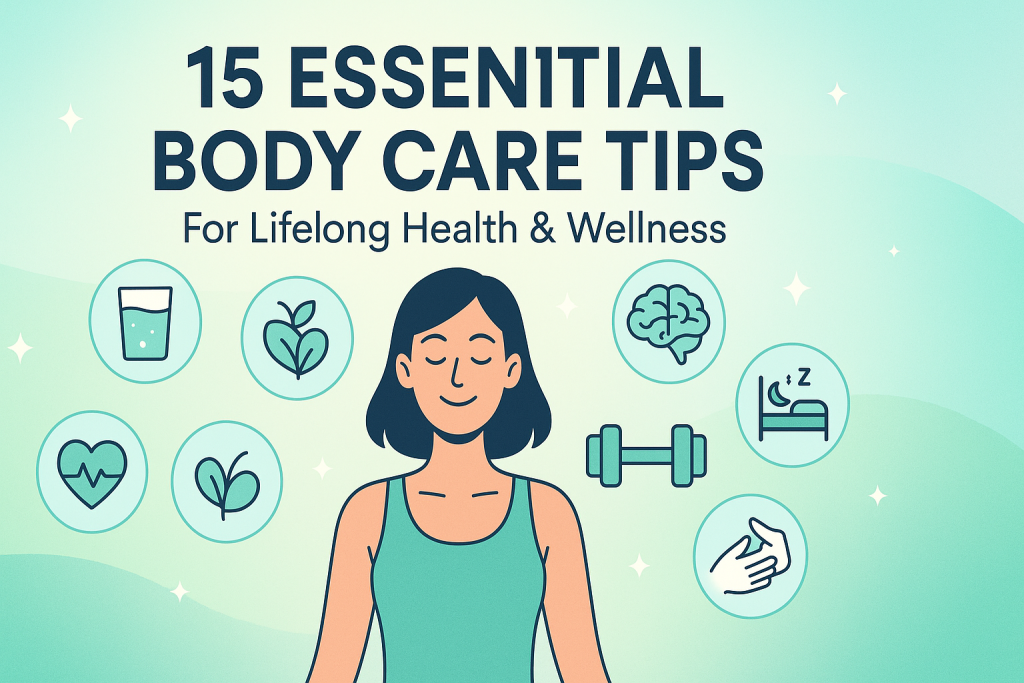
Body care goes far beyond looking good on the outside. It’s about nurturing your physical, mental, and emotional health. By building a foundation of healthy routines, you can prevent disease, increase energy, and improve longevity. The following guide outlines 15 essential strategies for optimal body care, helping you feel your best at every stage of life.
1. Nourish Your Body with Balanced Nutrition
The Role of a Healthy Diet
A balanced diet is the cornerstone of body care. Consuming a variety of nutrient-rich foods provides your body with the building blocks it needs for energy, repair, and immune function. According to the World Health Organization, poor diet is one of the leading causes of chronic diseases worldwide.
Key Principles of Balanced Nutrition
- Eat a variety of fruits and vegetables: Aim for at least 5 servings daily to get essential vitamins and antioxidants.
- Include lean proteins: Such as chicken, fish, beans, and legumes, to support muscle health.
- Choose whole grains: Replace refined grains with brown rice, quinoa, oats, or whole wheat products for sustained energy.
- Limit processed foods: Avoid excess sugar, salt, and unhealthy fats by minimizing packaged snacks and junk food.
- Stay hydrated: Water is vital for every cell in your body. Most adults need at least 8 cups (2 liters) per day.
Practical Nutrition Tips
Plan your meals ahead, practice mindful eating, and listen to your body’s hunger cues. Consider consulting a registered dietitian for personalized guidance, especially if you have specific health concerns or dietary restrictions.
2. Engage in Regular Physical Activity
The Benefits of Exercise
Regular physical activity is one of the most effective ways to maintain a healthy body. Exercise strengthens the heart, builds muscles, improves mood, and reduces the risk of chronic illnesses such as diabetes and hypertension.
According to the Centers for Disease Control and Prevention (CDC), adults should aim for at least 150 minutes of moderate-intensity aerobic activity per week, plus two days of muscle-strengthening exercises.
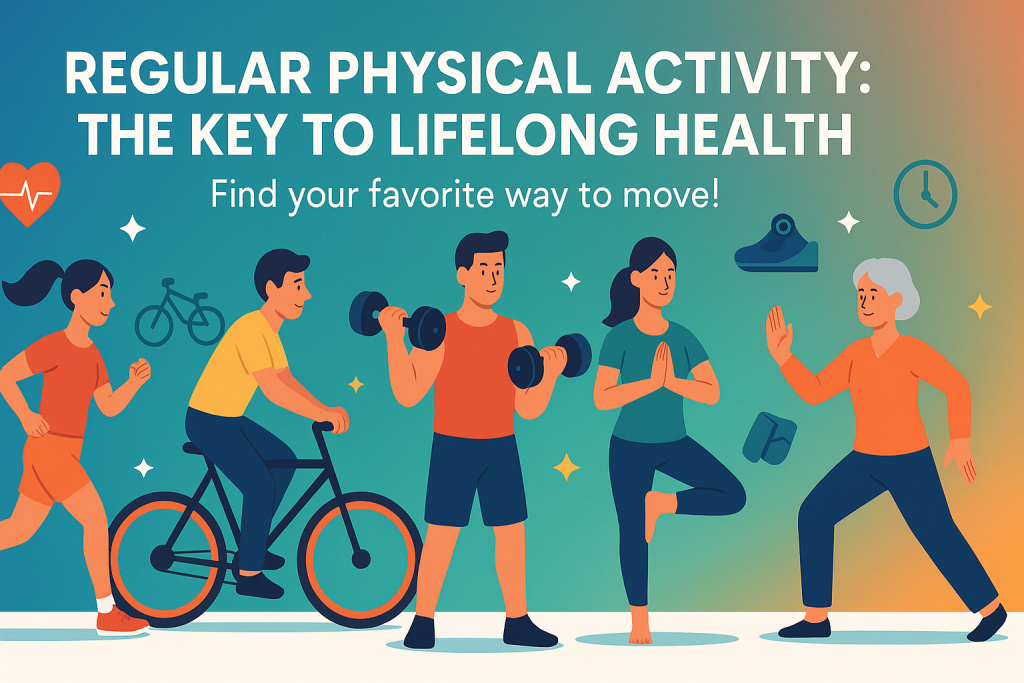
Types of Physical Activity
- Cardio: Walking, jogging, cycling, swimming, and dancing
- Strength training: Weightlifting, resistance bands, or bodyweight exercises
- Flexibility: Yoga, stretching, or Pilates to improve joint health and reduce injury risk
- Balance: Activities like tai chi or balance exercises, especially important as we age
Tips for Staying Active
To promote sustained engagement in physical activity, it is advisable to select activities that you find personally enjoyable, as this increases the likelihood of maintaining a consistent routine. Establish achievable and specific goals to monitor your progress and foster a sense of accomplishment. Consider inviting friends, family members, or colleagues to participate, as social support can enhance motivation and accountability. Incorporate movement into your daily schedule by identifying opportunities for physical activity, such as opting to use the stairs instead of the elevator, or taking short walks during breaks throughout the workday. By integrating these practices, you can make physical activity a regular and rewarding component of your lifestyle.
3. Prioritize Quality Sleep
Why Sleep Matters
Adequate sleep is essential for both physical and mental well-being, serving as a fundamental component of a healthy lifestyle. During sleep, the body undergoes critical restorative processes, including the repair and rejuvenation of tissues, the consolidation of newly acquired memories, and the regulation of important hormonal functions. These processes contribute to optimal cognitive performance, emotional stability, and overall physical health. Conversely, chronic sleep deprivation has been scientifically linked to a variety of adverse health outcomes. Individuals who consistently fail to obtain sufficient sleep are at a higher risk of experiencing weight gain, a weakened immune system, and an increased susceptibility to mental health concerns such as anxiety and depression. As such, prioritizing regular, restorative sleep is vital for maintaining long-term health and productivity in both personal and professional spheres.
Strategies for Better Sleep
- Maintain a regular schedule: Go to bed and wake up at the same time every day.
- Create a restful environment: Keep your bedroom cool, dark, and quiet.
- Limit screen time: Avoid phones, computers, and TV at least an hour before bed.
- Avoid caffeine and heavy meals: Especially in the evening, to prevent disrupted sleep.
If you struggle with sleep, consider relaxation techniques such as deep breathing or meditation. Consult your doctor if sleep problems persist.
4. Stay Hydrated for Optimal Function
The Science of Hydration
The human body is composed of approximately 60 percent water, underscoring the critical importance of maintaining adequate hydration for overall health and well-being. Proper hydration plays a vital role in supporting numerous physiological functions, including the facilitation of digestion, the promotion of efficient circulation, the regulation of body temperature, and the enhancement of cognitive performance. Insufficient water intake, even at mild levels of dehydration, can have immediate negative effects, such as increased feelings of fatigue, the onset of headaches, and a decline in the ability to concentrate. Therefore, it is imperative to prioritize regular water consumption to ensure optimal physical and mental functioning throughout the day.
How Much Water Do You Need?
Although the recommendation to consume eight cups of water per day is widely recognized, individual hydration requirements can differ significantly based on a variety of factors, including your level of physical activity, the climate or environment in which you live, and your unique physiological needs. It is important to monitor your hydration status by observing the color of your urine; maintaining a light yellow color generally indicates adequate hydration. Additionally, you should increase your fluid intake during periods of increased physical exertion, such as exercise, or when exposed to hot or humid weather conditions, as these situations can cause your body to lose more fluids through sweat and respiration. By adjusting your water consumption to reflect these variables, you can better support your overall health and well-being.
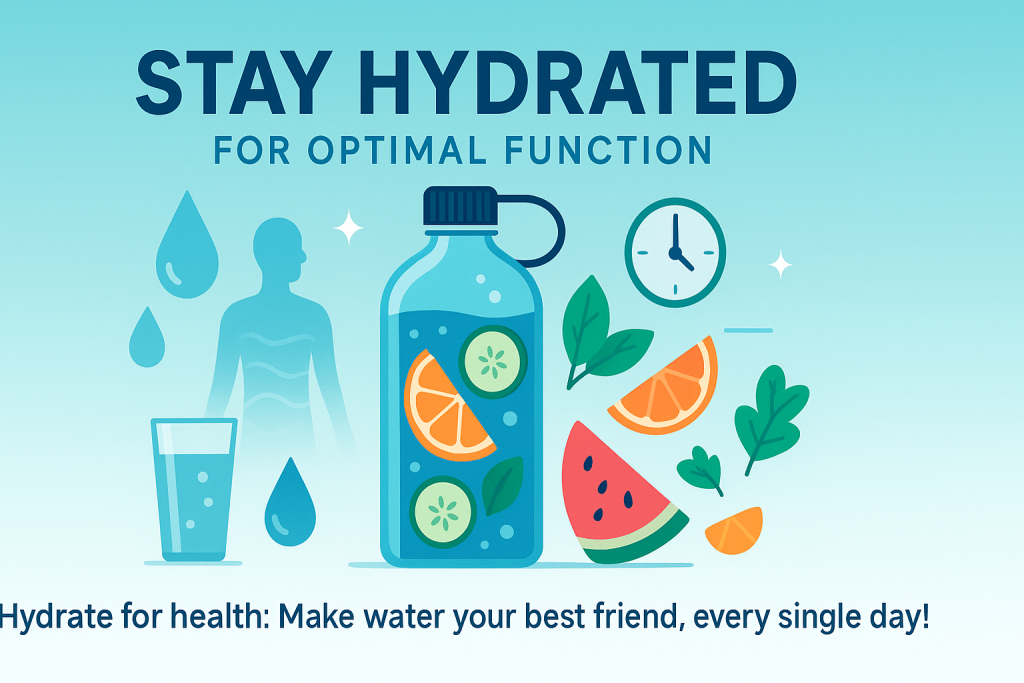
Tips to Boost Hydration
- Carry a reusable water bottle.
- Infuse your water with fruits or herbs for flavor.
- Eat water-rich foods like cucumbers, watermelon, and oranges.
5. Practice Effective Stress Management
Impact of Stress on the Body
Prolonged exposure to chronic stress has been shown to adversely affect various aspects of physical health. Specifically, sustained stress can compromise the effectiveness of the immune system, rendering the body more susceptible to illness and infection. Additionally, it can interfere with normal sleep patterns, leading to difficulties in falling or staying asleep, which in turn may further impact overall well-being. Chronic stress is also recognized as a contributing factor to the development of high blood pressure, increasing the risk of cardiovascular issues, as well as exacerbating digestive disturbances and gastrointestinal disorders. Given these significant health implications, it is essential for individuals to develop and implement effective stress management strategies. By proactively addressing stress, individuals can help safeguard their health, enhance their quality of life, and reduce the risk of stress-related medical conditions.
Proven Stress-Reduction Techniques
- Practice mindfulness: Meditation, yoga, or gentle breathing exercises promote calmness.
- Stay social: Connect regularly with friends and family for emotional support.
- Prioritize self-care: Schedule time for hobbies, relaxation, and activities that bring joy.
- Seek professional help: If stress feels overwhelming, consider talking to a counselor or therapist.
6. Foster Healthy Relationships
The Link Between Social Connections and Health
Numerous studies have demonstrated that engaging in positive social interactions can significantly contribute to improved mental and physical health outcomes. Individuals who maintain strong, supportive relationships are less likely to experience mental health challenges such as anxiety and depression. Furthermore, there is evidence to suggest that these individuals may also have a reduced risk of developing certain physical illnesses, likely due to the emotional and psychological support they receive from their social networks. According to research conducted by Harvard Medical School, the benefits of robust interpersonal connections extend even further, with findings indicating a potential link between strong relationships and increased life expectancy. These insights underscore the critical importance of fostering and maintaining healthy social relationships, both in personal and professional contexts, to promote overall well-being and longevity.
Building a Supportive Network
- Spend quality time with loved ones.
- Communicate openly and honestly.
- Set boundaries to protect your mental and emotional health.
- Join clubs, volunteer, or participate in community activities.
Remember, healthy relationships require effort and mutual respect. Invest in those that nourish your well-being.
7. Maintain Personal Hygiene
Importance of Good Hygiene Habits
Maintaining high standards of personal hygiene is essential for safeguarding individual health and well-being, as well as for upholding a positive image in both personal and professional settings. Adhering to proper hygiene practices, such as regular handwashing, bathing, and oral care, significantly minimizes the risk of contracting and transmitting infectious diseases caused by viruses and bacteria. By consistently implementing these measures, not only do individuals contribute to their own physical health, but they also demonstrate respect and consideration for the health and safety of colleagues, clients, and the broader community. Furthermore, good personal hygiene fosters greater self-confidence and comfort in social interactions, which can have a positive impact on workplace productivity and relationships. Organizations are encouraged to promote hygiene awareness and support employees in maintaining these standards, thereby contributing to a healthier and more collaborative working environment.
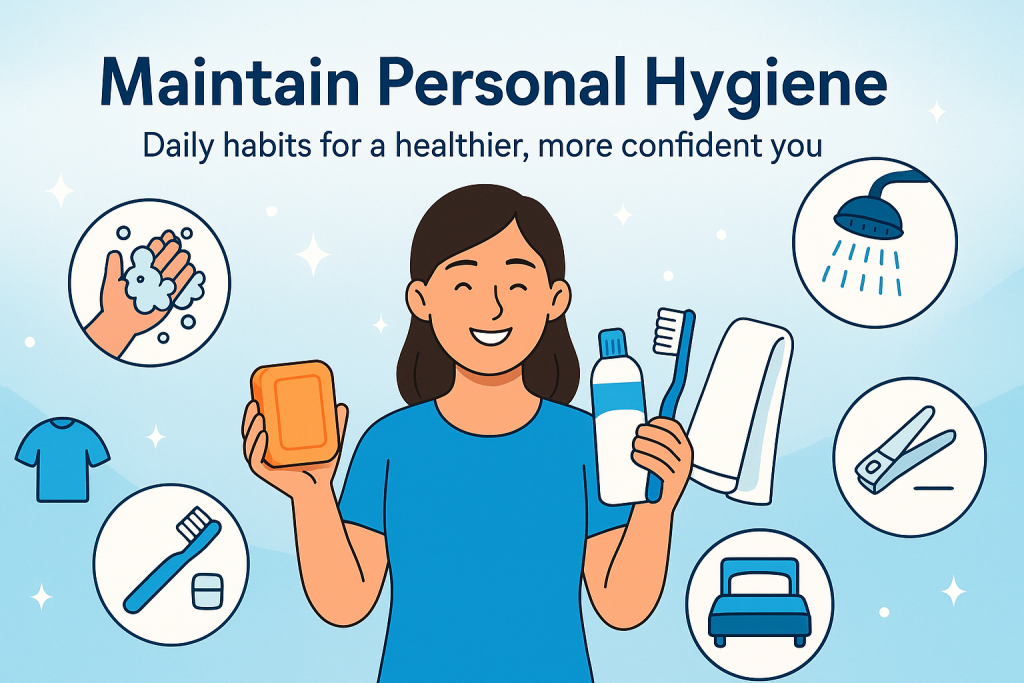
Daily Hygiene Checklist
- Bathe or shower regularly.
- Brush and floss teeth twice daily.
- Wash hands frequently, especially before eating or after using the restroom.
- Trim fingernails and toenails.
- Launder clothes and bed linens regularly.
Practicing proper hygiene also extends to your living space. Keep your home clean and clutter-free for a healthier environment.
8. Protect Your Skin
Why Skin Care Matters
The skin serves as a vital protective barrier for the human body, safeguarding internal organs against harmful bacteria and environmental hazards. In addition to its protective function, the skin plays a crucial role in regulating body temperature and facilitating the sense of touch, both of which are essential for overall health and well-being. Adhering to a comprehensive skin care regimen is important, as it not only helps to prevent infections and the onset of premature aging but also reduces the risk of developing certain types of skin cancer. By maintaining the health and integrity of the skin through proper care, individuals can support their overall health and enhance their quality of life.
Essential Skin Care Tips
- Wear sunscreen daily with at least SPF 30, even on cloudy days.
- Moisturize to prevent dryness and maintain skin elasticity.
- Avoid harsh chemicals and hot water, which can strip natural oils.
- Examine your skin regularly for unusual moles or changes.
Consult a dermatologist for personalized advice, especially if you have chronic skin conditions.
9. Cultivate Mental and Emotional Health
The Mind-Body Connection
The relationship between mental and emotional well-being and physical health is both profound and complex. Numerous studies have demonstrated that psychological conditions such as chronic stress, depression, and anxiety are not isolated from physical health; rather, they have a significant impact on the body’s physiological functioning. When an individual experiences prolonged periods of stress or emotional distress, the body may respond with various physical symptoms, including persistent headaches, ongoing fatigue, and disruptions in digestive processes. These manifestations serve as important indicators of the interconnected nature of mental and physical health. Addressing psychological factors is therefore essential not only for emotional stability but also for the maintenance of overall physical wellness. Recognizing and managing mental health concerns can play a crucial role in preventing or alleviating associated physical ailments, thereby supporting a more comprehensive approach to personal well-being and health care.
Tips for Emotional Well-Being
- Practice gratitude and positive thinking.
- Engage in activities that bring you joy and fulfillment.
- Learn to process and express your emotions healthily.
- Seek help from mental health professionals as needed.
Remember, taking care of your mind is just as important as nurturing your body.
10. Avoid Harmful Habits and Substances
Risks of Substance Abuse
The use of tobacco products, excessive consumption of alcohol, and the intake of recreational drugs are behaviors that have been conclusively shown to cause substantial harm to the human body. Engaging in these activities significantly elevates the risk of developing a wide range of serious health conditions, including, but not limited to, respiratory diseases such as chronic obstructive pulmonary disease (COPD) and emphysema, liver disorders such as cirrhosis and hepatitis, various forms of cancer, and additional chronic illnesses that can severely impact quality of life. The World Health Organization (WHO) has reported that tobacco use alone is responsible for the deaths of more than 8 million individuals each year on a global scale. This alarming statistic underscores the critical need for increased awareness and proactive measures to reduce the prevalence of such behaviors. For both individuals and organizations, prioritizing health by discouraging smoking, limiting alcohol intake, and avoiding recreational drug use is essential to fostering a safer, healthier environment and ultimately reducing the incidence of preventable diseases.
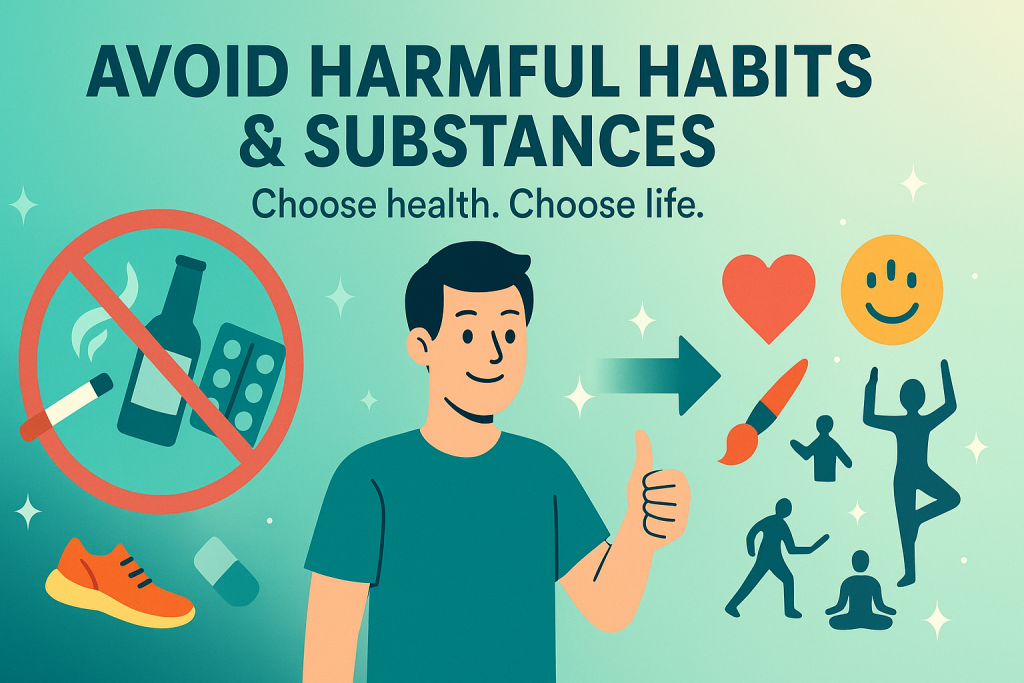
Making Healthy Choices
- Seek support for quitting smoking or substance use.
- Limit alcohol consumption—no more than one drink a day for women, two for men.
- Choose healthy coping mechanisms for stress, such as exercise or creative pursuits.
Making conscious lifestyle changes reduces health risks and supports longevity.
11. Visit Your Healthcare Provider Regularly
The Value of Preventive Care
Routine medical examinations play a vital role in promoting overall health and well-being by facilitating the early identification of potential health concerns. Detecting medical issues at an early stage significantly enhances the effectiveness of treatment options and outcomes. Comprehensive health assessments, including regular screenings for various conditions, ensure that any emerging health risks are identified promptly. Additionally, staying current with recommended vaccinations is essential for preventing the onset and spread of infectious diseases. These proactive measures not only support disease prevention but also contribute to more efficient management of existing health conditions, thereby improving quality of life and reducing long-term healthcare costs. Engaging in regular medical checkups demonstrates a commitment to personal health and enables individuals to make informed decisions regarding their healthcare.
Recommended Health Screenings
- Annual physical exams
- Blood pressure and cholesterol checks
- Cancer screenings (such as mammograms, colonoscopies)
- Dental and vision exams
- Vaccinations and booster shots
Discuss your risk factors and health concerns with your doctor to develop a personalized care plan.
12. Foster a Positive Body Image
Embracing Self-Acceptance
Body care extends beyond the pursuit of a specific physical appearance; it encompasses a holistic approach to overall well-being. Cultivating a positive body image plays a critical role in this process, as it fosters a sense of respect and appreciation for one’s body, independent of its shape or size. By maintaining a healthy and affirming perspective towards your body, you are more likely to engage in consistent self-care practices that support both physical and mental health. This approach encourages individuals to prioritize their well-being, recognize the value of their bodies, and develop habits that contribute to long-term health and self-esteem.
Strategies for Building Body Confidence
- Avoid comparing yourself to unrealistic images on social media.
- Focus on your body’s abilities and strengths.
- Practice self-compassion and positive self-talk.
- Wear clothes that make you feel comfortable and confident.
Celebrate what makes you unique and set healthy, realistic goals for yourself.
13. Establish Healthy Routines and Habits
The Power of Consistency
Implementing gradual, sustainable changes can yield significant long-term benefits for both individuals and organizations. By systematically developing structured routines related to nutrition, physical activity, sleep, and self-care, individuals are better equipped to sustain their progress and achieve consistent results. Establishing these routines not only fosters healthy habits but also minimizes the cognitive burden associated with making frequent decisions, thereby reducing decision fatigue. Over time, this approach supports overall well-being, enhances productivity, and contributes to ongoing personal and professional development.
Tips for Building Lasting Habits
- Set specific, achievable goals.
- Track your progress with journals or apps.
- Reward yourself for milestones.
- Find an accountability partner.
- Be patient and persistent—growth takes time.
Start with one or two habits, gradually adding more as you gain confidence.
14. Listen to Your Body’s Signals
Building Self-Awareness
The human body continuously conveys important signals regarding its physical and emotional well-being, such as indications of hunger, fatigue, discomfort, or stress. Cultivating a heightened sense of body awareness enables individuals to recognize and accurately interpret these signals in a timely manner. By developing this awareness, you are better equipped to respond appropriately to your body’s needs, whether that involves resting, nourishing yourself, managing stress, or seeking medical attention. This proactive approach not only enhances overall health and productivity but also plays a critical role in minimizing the risk of injury and illness by addressing potential issues before they escalate. Being attentive to your body’s cues fosters a more balanced, healthy lifestyle and contributes to long-term well-being.
How to Tune In to Your Body
- Pause regularly to assess how you feel physically and emotionally.
- Adjust activities based on your energy and stress levels.
- Don’t ignore persistent symptoms—seek medical advice promptly.
Respecting your body’s signals is a key aspect of proactive self-care.
15. Make Time for Self-Care and Relaxation
The Role of Rest and Recreation
In the context of our increasingly demanding schedules and professional commitments, it is imperative to prioritize self-care as a fundamental component of maintaining both personal well-being and sustained productivity. Allocating dedicated time for rest and engaging in leisure activities is not merely a luxury, but a necessity for rejuvenating our physical and mental resources. Such practices play a critical role in mitigating the risk of burnout, enhancing overall energy levels, and fostering resilience in the face of daily challenges. Moreover, by consistently investing in self-care, individuals are better positioned to achieve a healthy work-life balance, which is integral to long-term fulfillment and sustained professional success. Ultimately, the deliberate incorporation of rest and leisure into our routines contributes significantly to enduring happiness and optimal performance.
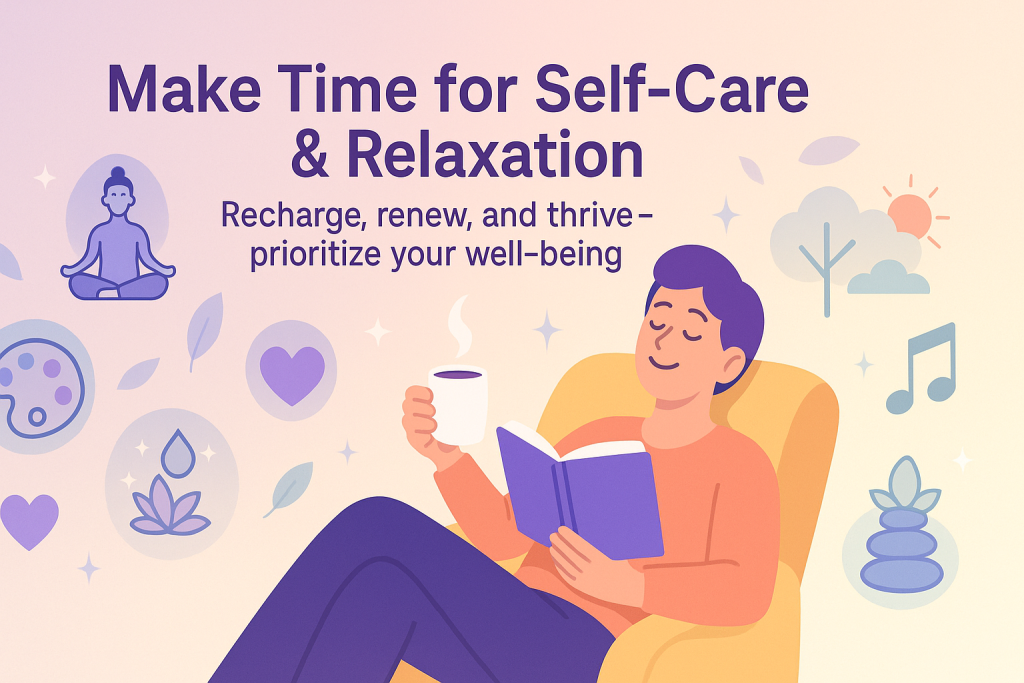
Ideas for Self-Care
- Practice meditation or gentle stretching.
- Indulge in a favorite hobby or creative pursuit.
- Enjoy nature walks or time outdoors.
- Take breaks from screens and technology.
- Book a massage or spa treatment occasionally.
Prioritizing self-care isn’t selfish—it’s a necessary part of comprehensive body care.
Conclusion: Start Your Journey Toward Lifelong Body Care
Committing to body care is a lifelong journey, not a quick fix. By implementing these 15 proven strategies, you can build a foundation for vitality, resilience, and happiness. Remember, the most important step is the one you take today—no matter how small. Choose one or two areas to focus on first, celebrate your progress, and continue learning as you go.
Your body is your lifelong companion. Treat it with the care, respect, and gratitude it deserves, and enjoy the benefits of a healthier, more fulfilling life.

